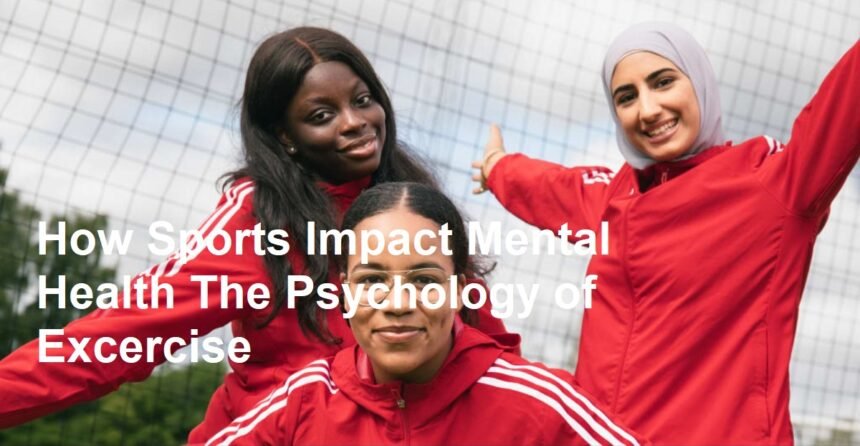Introduction
When most people think of sports, they picture stronger muscles, better stamina, and physical health. But there’s another side of the story that often goes unnoticed: the powerful link between sports and mental health.
From lowering stress to boosting self-esteem, sports can be just as effective for your mind as they are for your body. In fact, many psychologists now recommend exercise therapy as part of mental health treatment. Let’s dive into how sports affect the brain, why they’re so effective, and how you can use them to improve your everyday life.
The Science Behind Sports and Mental Health
Endorphins and Sports: Your Natural Mood Boosters
When you exercise, your brain releases chemicals called endorphins. These are often called the “feel-good hormones” because they help:
- Reduce pain
- Boost happiness
- Lower anxiety
Ever heard of the “runner’s high”? That’s endorphins at work. The same feeling can happen after playing basketball, swimming, or even a fun dance workout.
Exercise Therapy Explained
Exercise therapy uses physical activity as a tool to manage mental health conditions such as depression, anxiety, and even trauma. Regular movement helps regulate sleep, balance hormones, and promote relaxation—all of which are crucial for a healthy mind.
Sports as Stress Relief
Breaking the Cycle of Stress
When you’re stressed, your body produces cortisol—the stress hormone. Too much cortisol over time can harm your mood, sleep, and energy. Sports interrupt this cycle by reducing cortisol levels and replacing them with endorphins.
Practical Ways to Use Sports for Stress Relief
- Low-intensity sports like yoga, walking, or cycling are great for calming the mind.
- High-intensity activities like CrossFit, running, or boxing can help release pent-up energy and frustration.
- Team sports like soccer or basketball provide social support, which is another powerful stress reliever.
Sports and Self-Esteem
Building Confidence Through Progress
Achieving small milestones—like running an extra mile, lifting heavier weights, or scoring a goal—boosts confidence. Over time, these wins contribute to stronger self-esteem.
Social Benefits of Sports
Joining a sports club or fitness class helps you connect with others who share the same goals. This sense of belonging is essential for mental well-being and can fight feelings of isolation.
Exercise Therapy in Everyday Life
How to Get Started
If you’re looking to use sports as a form of exercise therapy, start small. You don’t need to train like a pro athlete—just 20–30 minutes of moderate activity a few times a week can make a difference.
Practical Tips
- Find something you enjoy – Don’t force yourself into a sport you hate. Enjoyment increases consistency.
- Set realistic goals – Start with simple goals like walking 3 times a week or joining a local class.
- Mix it up – Combine cardio, strength, and flexibility exercises for balanced results.
- Stay consistent – The mental health benefits grow over time, so keep going even if results aren’t immediate.
Sports and Mental Health for Women and Men
Unique Benefits for Women
Sports can help women manage hormonal changes, boost confidence, and fight stereotypes about body image. Group workouts also provide a sense of community and empowerment.
Unique Benefits for Men
Men often struggle with expressing emotions due to societal pressure. Sports offer a healthy outlet for stress, frustration, and emotional release—without stigma.
Beyond the Gym: Daily Lifestyle Choices
Small Habits That Support Mental Health
- Take the stairs instead of the elevator.
- Go for a short walk during lunch breaks.
- Try stretching before bedtime to improve sleep.
These small lifestyle habits, combined with sports, create a holistic approach to sports and mental health.
Potential Pitfalls: When Sports Become Stressful
Overtraining Risks
Too much exercise without enough rest can lead to burnout, fatigue, and even worsen anxiety. Balance is key.
Pressure to Perform
Competitive sports sometimes create stress if the focus is only on winning. Remember: the goal is overall well-being, not perfection.
Conclusion:
Why Sports and Mental Health Go Hand-in-Hand
Sports are more than just a way to stay fit—they’re a natural form of exercise therapy, offering stress relief, mood regulation through endorphins and sports, and improved self-confidence.
You don’t need to be an athlete to reap the benefits. Just find an activity you love, stay consistent, and let sports become a powerful tool for both your body and your mind.
How have sports or exercise impacted your mental health? Do you use them as stress relief or confidence-building tools? Share your thoughts in the comments below—I’d love to hear your story!












